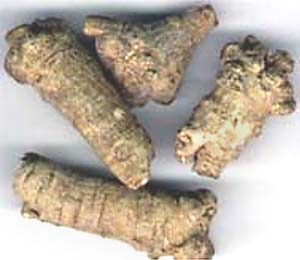Now that I’m on to ginseng-like herbs, here’s another one that can be taken during the summer. Its real name is Panax notoginseng, known in Chinese pinyin as san qi, but is best known by its commercial name, Tien qi ginseng.
It is definitely in the ginseng family, but has quite different properties from the ones we usually associate with other ginsengs.
Rather than tonifying Qi, this herb moves and builds Blood. But even better, while it moves Blood it also stops bleeding. This makes it a perfect application for any trauma from falls, fractures, contusions, wounds, cuts or sprains (for this reason it is used extensively by martial artists) and to stop bleeding in vomit, urine or stool along with nosebleeds and hemorrhaging.
In fact, it is used for any internal and external bleeding and should be taken frequently for this, both internally and externally placed on the wound in powder or liniment form. It is called Yunan Bai Yao in its patent form, which is widelyused to stop bleeding, specifically from gunshot wounds.
San qi also reduces swelling, alleviates pain and dissolves blood clots. I have seen it dissolve large blood clots and slow excessive menstrual bleeding and hemorrhage (high doses are needed for both). It is used for chest, abdominal and joint pain and diabetic retinopathy. As well, it lowers blood pressure and increases coronary artery flow. Because of its tonic circulatory properties, it is one of the most popular of all herbs used by the Chinese.
Image of San qi tubers from: ITM Online.
San Qi
Latin: Panax notoginseng, P. pseudoginseng
Family: Araliaceae
Part Used: root
Energy, taste and Organs affected: warm; sweet, slightly bitter; Liver, Stomach, Large Intestine
Actions: stops bleeding
Properties: hemostatic, cardiac tonic
Biochemical constituents: arasaponin A, arasaponin B, dencichine
Dose: 1-3 g powder; 3-9 g whole root, decoction; apply topically as needed
Precautions: pregnancy; Deficient Blood or Yin
Other: also known as pseudoginseng, notoginseng, tienchi, tien qi and tian qi
Indications: internal and external bleeding, nosebleed, blood in urine, vomit, mucus or stool, traumatic injury due to falls, fractures, contusions and sprains, chest and abdominal pain, angina, coronary heart diseases, joint pain, hemorrhage, injuries, wounds, excessive menstruation, diabetic retinopathy

